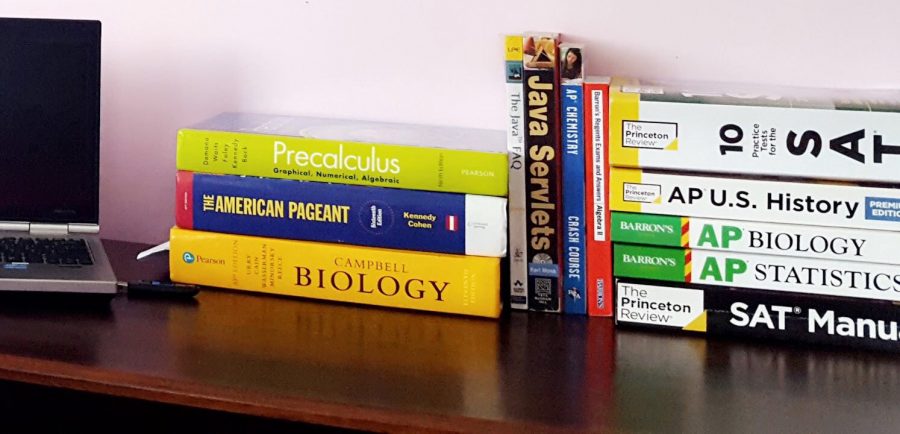As high school students approach the end of the academic year, the impending challenge of Advanced Placement (AP) exams can cause a whirlwind of emotions. The pressure begins to grow as the exams draw closer, and it’s very easy to feel overwhelmed by the weight of these expectations. However, it’s important to note that you aren’t alone in these feelings.
Countless students taking the same classes are facing the same stresses and uncertainties. To help relieve some of this stress, let’s explore some tips on how to prepare effectively for the upcoming AP exams.
1. Start Early
Beginning your preparation for AP exams in advance is one of the most important things you can do. It allows you more time to really delve into the topics that require you the most time to tackle. In most AP classes, I’m sure teachers have begun to talk about AP reviews and if they haven’t then this is your reminder that you should start now. Creating a study schedule that spans the weeks that lead up to the exam allows for the review to be manageable without the added stress of last-minute cramming right before the exam. Breaking down the material into smaller chunks while simultaneously spacing out your study sessions has been proven to help with things such as retention while also decreasing stress levels.
2. Utilize Available Resources
The College Board provides a wealth of resources to help students prepare for AP exams, including review books (which can be found on websites such as Amazon), online study guides, and even practice exams (which will be later discussed in this article). These resources offer valuable insight into the format along with the content of whatever exam(s) you are taking, helping you familiarize yourself with what to expect on test day. Additionally, seek out resources from your teachers, classmates, and online educational platforms to supplement your studying and gain multiple perspectives on challenging topics that could be potentially on your AP exam.
3. Form Study Groups
Collaborating with classmates who are also preparing for the same AP exams can help to enhance your studying experience. Study groups provide a place for discussing concepts, clarifying misunderstandings, and sharing study strategies. Study groups allow for you to explain topics that you understand that reinforces information while also having things explained to you that could boost your understanding. It is important to maintain the productivity of the study group and not allow for it to become a social hangout which doesn’t benefit anyone.
4. Practice Exams
Practice Exams are essential for familiarizing yourself with the format and pacing of the AP exams. Try to take full-length practice tests under timed conditions to simulate the testing environment and help you to gauge your readiness. Practice exams are easily accessible and can be found with a quick google search. Reviewing your answers afterward allows you to identify areas of weakness and focus on the found topics that require additional review. Additionally, a number of practice exams are scheduled at the high school; be sure to check Student Square for upcoming information.
5. Prioritize Self Care
AP Exam prep is important but it’s crucial to make sure to prioritize your well-being. Necessary things such as getting enough rest, eating nutritious meals, and engaging in light exercise are vital for maintaining a balanced physical and mental health. Taking breaks during study sessions allows for relaxation while also preventing burnout and enhancing your focus once you return to your studies.
6. Stay Organized
Keeping track of things such as important dates, deadlines, and study materials is a MUST when preparing for AP exams. There are tons of things out there that help to keep people organized but they vary depending on the person. So, here are a few of the most used tools: planners, calendars, and digital apps can help organize your study schedule, set reminders, and track your progress.
7. Focus on Weak Areas
Identifying areas where you need additional review is one of the most important things that help impact your studying. Make sure that you allocate more time to subjects or topics that you find challenging, and don’t hesitate to seek help from teachers, tutors, or online resources if needed because they are there to help you.
8. Develop Effective Study Techniques
Experimenting with different study techniques allows you to find methods that work best for you. Whether it’s making flashcards, creating concept maps, teaching the material to someone else, or the pomodoro method, finding engaging and effective study strategies enhances comprehension and retention. You can even try switching up the study techniques or make up your own if it works for you because at the end of the day you are the one taking the test. Remember, techniques that work for others may not work for you.
9. Stay Positive
Maintaining a positive mindset is essential during the stressful process of AP exam preparation. Believe in your abilities and remind yourself of the hard work that you’ve put in daily. Continue to celebrate your progress and achievements along the way and stay motivated by seeing achievable goals and not impossible ones. Focus on your strengths because that can boost your confidence and reduce anxieties as the test day rapidly approaches.
10. Prepare for Exam Day
At this point, you should be familiar with the exam format, rules, and procedures to help alleviate anxiety and make test day as smooth as possible. But if you haven’t done those things, make sure to do those as soon as possible. Gather all the needed materials, such as your school identification, approved calculators (if needed), reference sheets (if needed), black/blue pens, and number two pencils. Also make sure to plan your journey to the school for the test to avoid any last-minute rushes. Do your best to stay relaxed with things such as deep breathing to calm your nerves.
Now that you’ve taken the time to read all these tips, good luck on your AP exam(s)!
Remember that you aren’t alone in these feelings of stress and that other AP students are in the same boat that you are in.








